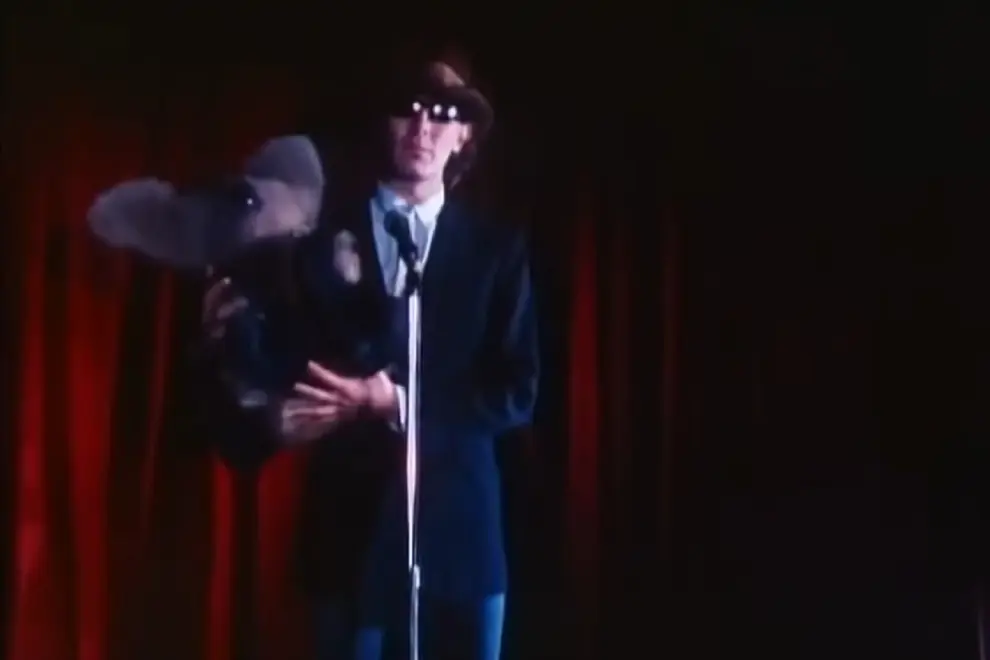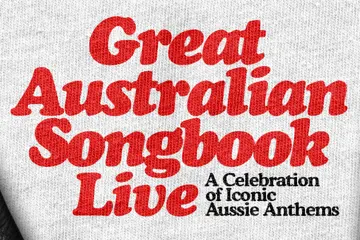The ARIA charts started 40 years ago. What was the first Australian song to go to number one?
Well, it wasn’t actually a song. It was a spoken-word comedy piece. And it was a blockbuster.
This is the remarkable true story of “Australia’s most dangerous and subversive performer”, his manager – who would become one of our biggest-selling recording artists – the vice squad, and the lawyer who would inspire the lead character in the TV series Rake.
Together, they made comedy history.
Forty years ago this week, Australiana knocked off Irene Cara’s Flashdance … What A Feeling to take the top spot on the Australian charts.
The piece was written by Billy Birmingham, a former record company promo person who helped to launch Little River Band’s debut album when he worked at EMI.
By 1983, he found himself managing Sandy Gutman, a comedian who initially called himself Isaac Cox. Fellow comedian Rodney Rude loved introducing him: “Ladies and gentlemen, I suck cocks. Yes, that’s right, I suck cocks!”
Cox decided to rename himself Austen Tayshus.
Gutman and Birmingham – “two great Sydney smart-arses”, according to their friend Wilbur Wilde – were a formidable combination. Gutman was a brilliant performer; Birmingham was a reluctant performer but a brilliant writer.
Don't miss a beat with our FREE daily newsletter
With his client needing material, Birmingham scribbled down his favourite Australian puns, listing place names, sayings and icons. He then created the storyline – his mate Boomer rang to invite him to a BBQ, and “Vegemite come too”.
“So I said to the wife, ‘Do you wanna Goanna?’ She said, ‘I’ll go if Dingoes.’
“So I said to Boomer, ‘Wattle we do about Nulla?’
“He said, ‘Nullarbors me to tears, leave him at home.’”
An Australian comedy classic was created in 50 minutes. It would become 1983’s biggest-selling single and spend eight weeks at number one.
Martin Fabinyi from Regular Records – then home to Mental As Anything and Icehouse – caught Gutman’s act at the Comedy Store in Sydney.
Fabinyi and Regular’s lawyer, Charles Waterstreet, negotiated the recording contract with Gutman and Birmingham.
“Billy was the hardest man I’ve ever negotiated with,” recalls Waterstreet, who was later the inspiration for the Cleaver Greene character in Rake. “He was insistent on every clause and sub-clause. But he had a way with words.”
“He was a total genius,” Gutman says.
Fabinyi and Waterstreet signed the comedian, and they recorded Australiana live at the Loony Bin, a comedy venue at the Kirribilli Pub Theatre. The BBQ for the video – which cost just $6000 to make – was shot at Birmingham’s house in Lindfield.
Gutman was in the shower when he heard on the radio that Australiana had hit number one. He cried. “I had failed and quit so many things,” he explained in the 2011 book Merchant of Menace. “I had become such a loser that it felt like my last chance to actually do something.
“In the Jewish culture it is encouraged, and sometimes expected, that you will attempt to do great things in your life. It was a relief more than anything.”
And then Australiana disappeared from the charts, and Flashdance returned to number one. The vice squad raided record stores, removing every copy of the single, threatening to charge the owners with “possessing an obscene item”.
The offending passages were believed to be “Boomer’s wife Wara sitting there tryin’ to Platypus”, the woman who’s “probably seen a Cockatoo” and Alice Springs starting to “pack Billabong”.
Australiana’s B-side, The Comedy Commando, also attracted the attention of the censors.
It was a strange situation: the radio kept playing the single, but people couldn’t buy it.
Gutman and Birmingham had to go to court the day Australia won the America’s Cup. The case was thrown out, and Australiana returned to number one.
Austen Tayshus spearheaded the golden age of Australian comedy. Suddenly, comedians were the new rock stars. Austen Tayshus, Rodney Rude and George Smilovici regularly appeared on bills with rock acts, and Smilovici had a smash hit in 1984 with I’m Tuff.
Austen Tayshus even appeared at the EAT concert, a forerunner of Live Aid, at Melbourne’s Myer Music Bowl. He told the crowd: “Why are we giving food to hungry people? They’ll just eat it, and then it’s gone.”
At the end of 1983, Martin Fabinyi flew to Warner’s head office in New York. The American executives had noticed the single’s success in Australia and believed it could perhaps translate to the US. Fabinyi played the track for the Warner bosses. “They sat there stone-faced, not a flicker of emotion. It was pretty clear they didn’t understand a word of it.”
Australiana was, unsurprisingly, a hit only in Australia.
Billy Birmingham would go on to become the biggest-selling comedy artist in Australian recording history as The Twelfth Man.
“To be honest, I’ve always been just a tiny bit embarrassed about Australiana,” Birmingham told Gutman’s biographers, Ross Fitzgerald and Rick Murphy. “It’s not the deepest material I’ve ever done. Punning is not regarded as humour’s greatest achievement.”
By my count, Australiana packs 51 Aussie puns into four minutes and 23 seconds.
After leaving the law, Charles Waterstreet has followed his friend into the comedy world and often serves as Austen Tayshus’ support act. They have a couple of gigs at the Bondi Theatre Company in October and November.
Post-Regular Records, Martin Fabinyi started Mushroom Pictures with Michael Gudinski, serving as an executive producer of Chopper. He then moved to Beyond Entertainment, where he was an executive producer of this year’s box office hit John Farnham: Finding The Voice. He is now working on a Midnight Oil documentary called The Hardest Line.
Fabinyi once told Gutman, “If it wasn’t for Australiana, you’d be driving taxis.”
The comedian followed the single with the comedy dance hit Phantom Shuffle, produced by The Sports’ Martin Armiger. It reached #16.
Austen Tayshus’ 1986 single, which celebrated The Pope’s Australian tour, was the first of four ARIA nominations for Best Comedy Release.
In 1988, as Australia celebrated the Bicentenary, Austen Tayshus released Highway Corroboree, an important comedy record that recognised that the country existed before white settlement. “They steal a loaf of bread at one end; they steal a country at the other.”
“It was probably the best thing I’ve done because it came at a time when we became consciously aware that the Aborigines were pissed off,” Gutman told his biographers. “For the first time in our history, it wasn’t hip to deny the injustice.”
Highway Corroboree reached #43 and appeared on Austen Tayshus’ second album, Whispering Joke.
Gutman says he agreed with Peter Garrett on “almost every issue” but found Midnight Oil to be “a bit humourless”. In 1989, he released Put Down That Stubbie, a savage send-up of Australia’s drinking culture and a parody of the Oils’ Put Down That Weapon. The Oils didn’t appreciate it.
Gutman pursued an acting career, appearing in the Sharon Stone movie Sliver, and in Holy Smoke, alongside Kate Winslet and Harvey Keitel. Director Baz Luhrmann is one of his many fans. “I think Sandy is a comedian of genius. He has a profound insight into the Australian character and way of life and is a performer of incredible power and versatility.”
Gutman also stood as a Sex Party candidate for federal parliament, running against the then-Liberal leader Tony Abbott.
In 2000, Austen Tayshus resurrected the Australiana concept for the AFL single Footyana.
In their book Merchant of Menace, Ross Fitzgerald and Rick Murphy said Sandy Gutman was a “quiet, intelligent Jewish boy who should have become a dentist”. Instead, he became Austen Tayshus “the great outsider of Australian comedy, who destroys almost everything he touches”.
Gutman, the son of a Holocaust survivor, acknowledged he was an aggressive and provocative comedian in the 2022 documentary Austen Tayshus: Skin In The Game.
“When I get on the stage, I shake it up. I unsettle the crowd, I challenge them, and I piss people off. If there’s no one left at the end of the night, that’s a top show.
“The more dangerous it is, the more I love it. If people don’t like what I do, they can fuck off.”
Waterstreet says his friend “has burned more bridges than Madison County”.
“I like to upset people,” Gutman told Andrew Denton on Enough Rope in 2005. “I like to push the audience as far as I can push them. If it means pushing them out the door, that’s great.
“Every comedian wants to be loved. I know that not everyone is going to love a comedian like me. But I love the comedian that I am because I’m striving to do something great in my life.
“If there’s one person listening to that, that’s okay.”
















